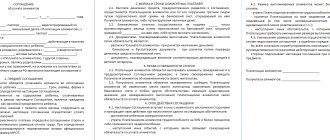It often happens that unscrupulous fathers evade paying child support for their child. In this case, mothers have to conduct a paternity test in order to bring the offender to justice. A paternity test may be needed in other situations. This procedure can only be carried out when contacting certain organizations. You will also have to pay a state fee for this. Its size will depend on the institution to which the parent applies. Further in the article we will consider ways to establish paternity and the amount of state duty for carrying out such a procedure.
Voluntarily
Registration of the child's father in marriage
State duty : free
Reason : The Tax Code of the Russian Federation in Chapter 25.3 on state duties does not establish a state duty for registering the birth of a child.
According to Article 48 of the Family Code of the Russian Federation, registration of a child is carried out with the indication of his father, if the child was born in marriage, or within 300 days after the termination of marriage (as a result of divorce, death of a spouse or for another reason), the child’s father is considered to be the spouse of his mother, until it has not been proven otherwise. The evidence will be a certificate (registry record) of the marriage of his parents (Article 17 of the Federal Law of November 15, 1997 No. 143-FZ “On Civil Status Acts”). The procedure for establishing paternity is not carried out in this case.
Establishing paternity
State duty: 350 rubles.
This amount of state duty includes both the establishment of paternity itself and the issuance of a certificate of this.
- If the father and mother of the child were not married, paternity can be established by their joint application. If there are good reasons, the application can be submitted in advance, before the birth of the child (in this case, registration, of course, will only take place after the birth).
A joint application can be submitted directly to the civil registry office, and also sent through the State Services portal, subject to signing with a simple electronic signature (Article 50 of the Federal Law “On Civil Status Acts”).
- When the mother cannot participate in filing the application (for example, she is declared incompetent), only a statement from the child’s father is sufficient.
This application can also be submitted in person or through the State Services portal. In this case, it is necessary to attach evidence of why the application was submitted by the child’s father alone - the mother’s death certificate, a court decision declaring her incompetent, etc. (Article 51 of the Federal Law “On registration of acts of civil status”).
If the father has not submitted an application, the child’s surname is recorded according to the mother’s surname, and the father’s first and patronymic names are recorded according to the mother’s instructions. At the request of the mother, information about the father may not be indicated at all.
Expert opinion
Lawyer Alexander Vasiliev comments
Recording information about the child's father from the mother's words and without the father's statement does not interfere with the further procedure for establishing paternity. This entry in itself does not give rise to any obligations for the alleged father. To collect child support from a specific citizen, paternity will need to be established in court.
Entering new data about the father into the child’s birth record
State duty : 650 rubles
Base : pp. 5 p. 1 art. 333.26 Tax Code of the Russian Federation.
Paternity can be registered after the birth of the child. This is possible even if the child has already reached the age of majority - but then his consent will also be required (clause 4 of article 48 of the Family Code of the Russian Federation).
At the same time, in addition to establishing paternity, the data of the birth certificate is changed - the child’s patronymic. In accordance with Art. 57 Federal Law “On Acts of Civil Status”, new information is entered into the birth record on the basis of an act of establishing paternity in the manner prescribed for making corrections. Therefore, the state duty for this action is paid in the amount established for making changes to civil status records.
Who registers information about the father voluntarily
If it is necessary to establish paternity (i.e. the child was not born in wedlock), the civil registry office, based on the results of consideration of the application to establish paternity, registers a civil status record and issues a corresponding certificate.
In addition to the civil registry office, local administration bodies can maintain civil status records (including establishing paternity) (Article 4 of the Federal Law “On Civil Registration”). As a rule, this happens in remote rural settlements where there are no civil registry offices.
In accordance with Order of the Ministry of Justice of the Russian Federation dated December 28, 2020 No. 307 “On approval of the Administrative Regulations for the provision of public services for state registration of acts of civil status by bodies carrying out state registration of acts of civil status on the territory of the Russian Federation,” the corresponding application can also be submitted through the MFC.
BCC for payment of the state duty - 318 1 0801 110 “State duty for state registration of paternity establishment, including the issuance of a certificate of paternity establishment.”
The state duty is paid according to the details of the civil registry office at the place of residence of the child’s father or mother, or at the place of state registration of the child’s birth. Payment of the state fee must be made before contacting the civil registry office.
Certificate of paternity
Confirmation of the entry of paternity establishment is the corresponding certificate. It states:
- Full name, date and place of birth, citizenship, nationality of the child’s father;
- the same information about the child’s mother;
- last name, first name, patronymic (both before and after paternity is established), date and place of birth of the child;
- date and number of the civil status record, place of its entry, details of the issued certificate of paternity.
Issuance of a duplicate paternity certificate
State duty : 350 rubles.
Grounds : clause 6, clause 1, art. 333.26 Tax Code of the Russian Federation
For the issuance of a repeated certificate (duplicate) of state registration of paternity establishment, the state duty is paid in the amount established for the issuance of repeated certificates of civil registration.
A duplicate certificate is issued by the civil registry office or other government body that issued the original certificate. The state duty is paid according to his details before contacting him.
Where to get details
The state duty is paid on a receipt, which indicates the necessary account details for crediting funds to the relevant authority. You can get them:
- when submitting an application to a judicial officer or registry office;
- look at the information stand of this institution;
- go to the official website of the government agency, where its details are also indicated.
You must understand that the established amount of the state fee must be paid exclusively to the relevant authority, and not to the general state treasury, otherwise if the invoice data does not match, your application will not be accepted. Therefore, be careful. Also, immediately check that the receipt, in addition to the invoice, indicates the name of the institution and the amount of tax. As for the restrictions in terms of payment options, they do not exist here; you can do this through any methods of depositing funds that are convenient for you.
Establishing paternity in court
State duty : 300 rubles.
Base : pp. 3 p. 1 art. 333.19 Tax Code of the Russian Federation
If the child’s father does not consent to voluntary registration, paternity can be established in court. This procedure applies when the child's parents are not married. If the parents are married, the paternity of the spouse is assumed by default (however, it can be challenged).
The applicant in the case of establishing paternity can be the child’s mother, guardian (trustee), or person who is dependent on the child. The child himself, upon reaching adulthood, can also submit such an application (Article 49 of the Family Code of the Russian Federation).
The requirement to establish paternity is non-pecuniary. Consideration of such cases falls within the powers of district courts of general jurisdiction (Articles 23 and 24 of the Civil Procedure Code of the Russian Federation). The state fee is paid at the location of the court that will hear the claim.
The plaintiff is given the choice of court (and, accordingly, the place of payment of the state duty):
- at the place of residence of the defendant (the child’s father); or
- at the place of residence of the plaintiff.
The state fee must be paid before going to court, and proof of payment must be attached to the application.
Do I need to pay a state fee?
Establishing paternity is necessary to determine the obligations and rights of a particular man in relation to his own child.
This procedure may be required if the latter was born outside of an official marriage. Expert opinion
Kurtov Mikhail Sergeevich
Practitioner lawyer with 15 years of experience. Specializes in civil and family law. Author of dozens of articles on legal topics.
If you do not do this, then applying for alimony will be much more difficult. You must first contact the registry office and the court.
To do this, you must pay the state fee for establishing paternity.
Establishment by the court of the fact of recognition of paternity
State duty : 300 rubles
Base : pp. 8 hours 1 tbsp. 333.19 Tax Code of the Russian Federation
When and how to establish a fact
The Civil Procedure Code of the Russian Federation provides for the possibility of establishing in court the fact of recognition of paternity in relation to a deceased citizen. Obtaining a court order may be necessary to confirm eligibility for payments for the deceased. State duty amount
The amount of the state duty for the judicial establishment of the legal fact of recognition of paternity is 300 rubles (clause 8 of part 1 of article 333.19 of the Tax Code of the Russian Federation).
Such cases are considered by a court of general jurisdiction in special proceedings (Article 262 of the Code of Civil Procedure of the Russian Federation). This means that instead of a statement of claim, a special statement must be sent to the court in a special proceeding.
A feature of cases in this category is the absence of a dispute about the law with anyone. Therefore, the procedure for establishing the fact of recognition of paternity does not apply if there is a dispute or disagreement with the citizen whom the applicant plans to recognize as the father. And such a dispute always exists if a citizen is alive and does not submit an application to the registry office voluntarily. Therefore, the fact of recognition of paternity can only be established posthumously in cases provided for in Article 50 of the Family Code of the Russian Federation, if:
- the citizen who recognized himself as the father of the child died;
- there was no marriage between him and the child’s mother; And
- During his lifetime, the child’s father did not draw up the necessary documents out of court.
Where to pay the state fee
Payment must be made according to the details of the district court at the place of residence of the applicant - the mother of the child. Details for paying the state fee can be found on the website or in the court office.
When to pay
The state fee must be paid before submitting the application. If you are eligible for benefits, you must attach proof of this in lieu of payment.
In accordance with the Tax Code, it is possible to obtain a deferment in the payment of state duty due to lack of funds or other valid reasons.
When does it make sense to go to court and pay the state fee?
The court has the right to establish the legal fact of recognition of paternity by a citizen after his death, if this gives rise to legal consequences in the form of:
- assignment of a survivor's pension;
- compensation for harm;
- registration of inheritance, etc.
In addition to confirmation of payment of the state fee for establishing the fact of recognition of paternity, the following must be attached to the application to the court:
- a copy of the death document of the putative father;
- a copy of the birth certificate;
- documents confirming that the child is dependent on the deceased;
- other available evidence (correspondence, etc.).
Evidence will also include testimony from witnesses (if any).
Expert opinion
Lawyer Alexander Vasiliev comments
When forming an evidence base, it is necessary to take into account what time of birth of the child we are talking about. Family legislation in the USSR and Russia has changed. At different times, different rules were applied regarding the conditions under which the fact of recognition of paternity can be established.
Sberbank Online
Here you will definitely need the details of the registry office or a ready-made receipt. The necessary information can be obtained from the government agency.
In the future, the money will be transferred as follows:
- The client logs into his personal account by entering his login, password and confirmation code.
- Select the “Payments and Transfers” menu, enter the organization’s INN in the appropriate field - it is indicated on the receipt.
- All details appear immediately after entering the TIN. They must be verified with the data taken from the registry office.
- The payer enters his full name, registration address, and indicates the purpose of the payment - payment of the state fee for establishing paternity. The payment amount itself is also entered.
- Next, you need to click on the “Continue” button, check the entered information again and confirm the operation by entering the code received via SMS.
- Finally, it is recommended that you save your receipt. It can be taken from the transaction history and printed. It is provided at the time of application; without it, documentation will not be accepted.
This is important to know: How to hold an employee financially liable
Registration after a court decision
The court's decision to establish paternity or the fact of recognition of paternity is the main, but not the only stage in the forced establishment of paternity. After receiving a court decision, you must contact the civil registry office or its replacement local government body at the place where the court decision was made to draw up a civil status record.
The procedure is similar to voluntary registration of paternity. However, the basis for making an entry by the registry office will be a court decision, and not a statement from the parents.
You can contact the civil registry office at the place where the court decision was made, at the place of residence of the child’s father or mother, or at the place of state registration of the child’s birth. The state fee must be paid before submitting the application.
Payment methods and state duty refund
Expert opinion
Kurtov Mikhail Sergeevich
Practitioner lawyer with 15 years of experience. Specializes in civil and family law. Author of dozens of articles on legal topics.
In this case, citizens can use the payment options presented above. The exception is the Gosuslugi portal: filing a claim through it is not available.
When applying to the registry office or court, citizens can use any convenient payment method. To do this, it is enough to know the details of the government agency and deposit money before submitting the application. Funds are transferred to the account instantly, and a receipt is used as confirmation of payment, issued immediately after the money is deposited.
Even after the divorce, parents are not relieved of their responsibility to provide for their own children. If one of them cannot live with the child, funds for the maintenance of the child are collected from him. What will be the amount of the state duty for alimony in 2017 if a claim for alimony payments is filed separately from the application for divorce?
Challenging the record of the child's father
State duty : 300 rubles.
Base : pp. 3 p. 1 art. 333.19 Tax Code of the Russian Federation.
Challenging paternity and excluding information from the registration record about the father is carried out in the manner established by Article 52 of the Family Code of the Russian Federation. The requirement cannot be satisfied if the registered father of the child knew that he was not the father, but agreed to enter information about himself as the father in the child’s birth record.
These cases are heard by district courts of general jurisdiction. In this case, the general rule of territorial jurisdiction applies - at the location of the defendant. Typically, the defendant in the case will be the mother of the child.
The state fee is paid according to the details of the court authorized to consider the case.
Expert opinion
Lawyer Alexander Vasiliev comments
In such cases, the court makes a decision, always acting in the interests of the child. As a rule, a genetic examination is carried out in the case. Her conclusion will be one of the proofs, although not always decisive. In addition, starting from the age of 10, the child’s opinion is also taken into account in such cases.
Cost of alimony
The amount of these payments directly depends on the number of children:
- at least 1/4 of the salary is paid per person,
- for 2 children - at least 1/3,
- for 3 or more children - at least 1/2.
Accruals begin from the date on which the claim was filed. The basis for this is Article No. 107 of the Family Code. However, if paternity is not proven, payments are stopped. The time that passed before the claim was filed is not included in the claim for benefits.










